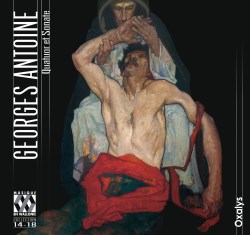
|
Georges ANTOINE (1892-1918)
Piano Quartet in D minor Op.6 (1916) [29:15]
Sonata in A flat major for violin and piano Op.3 (1912/3, rev. 1918) [22:10]
Shirley Laub (violin); Elisabeth Smalt (viola); Amy Norrington (cello); Jean-Claude Vanden Eynden (piano)
rec. AMUZ, Antwerp, Belgium, 2014
MUSIQUE EN WALLONIE MEW1473 [51:25]
Georges Antoine who died aged twenty-six at the very end of World War I is little-known, even in Belgium. So it may not be totally useless to go into some detail concerning his all-too-short life and composing career. His output is rather limited though far from uninteresting.
He was born in Liège and studied at the Conservatoire with Sylvain Dupuis, a well-reputed teacher and a distinguished composer in his own right. When the First World War broke out, Antoine enlisted although he might have been exempted on medical grounds had he chosen. He felt that he had to join up in defence of his country, the more because many thought at the time that the First World War would be over within a few weeks. It eventually turned out to be one of the most appalling, senseless massacres in man's history. Before the outbreak of the war Antoine had already composed several songs. He went on writing songs at intervals during the war. Incidentally twenty of his songs have been recorded on Musique en Wallonie CYP 5680 - a disc that is still available. He also composed a handful of more ambitious works that still await performance: Vendanges de 1914 Op.8 for soprano and orchestra on a poem of Paul Fort, a Piano Concerto Op.5 (ca.1914, lost, so far) and his last orchestral work Veillées d'armes Op.9 (1917) whose score is on display at the Philharmonic Hall in Liège. The first page of the score looks tantalising indeed. The bulk of his output consists of songs while both the Violin Sonata Op.3 and the Piano Quartet Op.6 are his most important chamber works.
Obviously Antoine regarded his substantial Violin Sonata Op.3 as a landmark in his music-making. He worked at it for many years and revised it to the end. The original version was in four movements but Antoine had doubts about the overall structure and started revising it. He replaced the last two movements with a brilliant Finale and – most probably – tightened the internal structure of the first two movements. This he did after consulting Vincent d'Indy and his former teacher Sylvain Dupuis. Both suggested amendments. In the end the final shape of the work is perfectly balanced, each of the three movements never outstaying its welcome. The slow movement Assez lent is particularly beautiful whereas the energetic final Résolu et animé has all the character of an animated rustic dance.
Antoine embarked on the composition of the Piano Quartet Op.6 soon after the first performance of the Violin Sonata. Again the circumstances were such that the completion of the Quartet was at first slowed down. It was finished by April 1916 so that Antoine was able to send a copy of both scores to d'Indy who apparently approved of them. The Piano Quartet is a big-boned piece but, as Christophe Pirenne rightly remarks in his excellent notes, “the profusion of ideas is still present but in more structured form”. One can also notice Antoine's growing formal mastery which coupled with his warmly melodic gift adds to the attraction of the piece. Again, the slow movement is just marvellous and contrasts happily with the more animated outer movements.
One last irony had it that the Violin Sonata and the Piano Quartet were performed in Amsterdam just five days after Antoine's death. Both pieces were well received.
The music in each of these two works remains indebted to Franck and his followers and Antoine certainly knew some of Lekeu's music. Moreover his short composing career did not allow him to develop as he might have although there is some stylistic evolution over these painfully few years. One cannot but speculate on the path he might have followed but that is the eternal question about all the gifted artists who were slaughtered during the First World War. What about George Butterworth, Ernest Farrar, Frederick Kelly and Rudi Stephan?
Antoine's music was of its place and time and just had to be allowed to blossom. It is probably idle either to dismiss these two works as backward-looking oddities or to hail them as unjustly neglected master-works. I firmly believe that the truth lies in-between: unfulfilled promise hinting at real potential for renewal and development.
Whatever one's approach there is no doubting that the present performers put all their heart and mind into giving Antoine's often rousing music wonderful and committed readings. These works may not be earth-shattering masterpieces but they clearly deserve to be heard were it only for their musical accomplishment and their deeply human generosity.
Hubert Culot
 |
 |
|



 All Nimbus reviews
All Nimbus reviews








